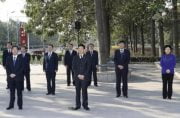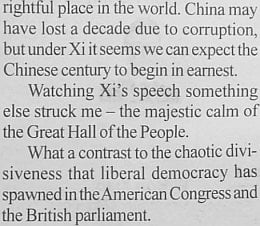It’s hard to keep up with the fast-swelling Xi Jinping personality cult. Officials in one town are paying homage to a (thriving) tree the Chairman-of-Everything once planted. Minions in another are ordering villagers to replace pictures of Jesus with images of the true divine prince. Xinhua’s 8,000-word mega-puff describes him as the unrivalled helmsman.
Presumably, dictators don’t have to specifically request this sort of treatment – aides pass the word down, and eager bureaucrats not already engaging in pre-emptive groveling rush to join in. Remember that Xi has fired, imprisoned, ruined, hounded, humiliated and tormented thousands of possible rivals and opponents (or ‘consolidated power’ as they say), so bowing to a tree to be safe is a no-brainer.
The test comes when the emperor notices the extent of the adulation: do his modesty and good taste lead him to ask the spin-doctors to tone it down, or does he love it and want more?
While we are waiting to find out how Louis XIV Xi goes, shoe-shiners will keep up the obsequiousness, and those with the right sort of motivation will probably sincerely buy into the worship and the hubris. It is a slide from the ridiculous to the disturbing.
Behold a little column by a Malaysian-born Hong Kong lawyer in the Standard somewhere along this incline…
Such public and zealous expressions of patriotic faith are hardly new in Hong Kong (since the 1980s, people have bent with the wind, opportunistically leaped to support the new winning team, avenged old colonial racial scores, or just hedged their bets for family or business reasons). But we should expect a lot more of it as Hong Kong’s pro-Beijing and pro-establishment camp adjusts to a ‘new normal’ of shoe-shining.
Even if the propaganda machine refrains from full-blown deification of Xi Jinping, it will certainly turn up the glorification of the Communist Party and nation. As economic growth slows and financial, demographic, environmental and other long-term problems become apparent, the leadership must depend more on strident Chinese nationalism for legitimacy/survival.
As the Mainlandization of Hong Kong continues, local pro-Beijing forces will have to go along with it. Specifically, the traditionally secular business/bureaucracy establishment will have to more openly embrace Xi-New Era-style Chinese-ness and the Communist Party and its symbolism. (Which uni here will be first to open a X-thought Institute?)
At best, it’s going to be seriously stomach-churning.



I would sincerely urge Hemlock readers not to skip the Standard link above. Truly hilarious. So many highlights. I liked “the West that influenced my youth is inevitably losing its mojo, as youths today call it.”
Whoa, I dig you’re using my language, daddy-o. I was thinking you lawyers were “square” as we youths say.
Interesting how two people can look at the same thing and see it very differently. I look at the meeting of China’s Parliament and see row upon row of silent sycophants sitting stiffly through a 3-hour monologue which even the author of the Standard piece admits he didn’t listen to right through. Compare this with the lively cut-and-thrust of clashing ideas in Britain’s Parliament, and I know which I’m more comfortable with.
Interesting, too, that the author heralds China’s likely deal with one of the most authoritarian, socially backward and religiously bigoted dictatorships in the Middle East as a sign of progress, rather than a cynical abandonment of progressive principles for economic gain.
Thanks Hemmers, I missed that puff piece in today’s Sub-Standard. What, so transparency and accountability by government institutions are a bad thing?
And @ reductio – I haven’t heard the word “mojo” since Austin Powers!
@reductio
I can’t help but feel that the full version of that sentence ends “…when they’re not too busy listening to some of that unpleasant and disorientating racket that passes for popular music these days on their infernal gramophones, like Elvis Presley or those Beatle fellows.” It definitely brought this ancient sketch to mind.
@oldnewcomer
Technically the 19th National Communist Party Congress isn’t a parliamentary/ congressional meeting at all: it’s essentially the equivalent of the Conservative Party conference, or the Republican National Convention— all of which are fairly well orchestrated and — aside from the Labour Party — not known for their chaotic divisiveness. It would appear that our bootlicking barrister’s ignorance is not just limited to modern teenage slang — but extends to legislatures and constitutional matters: he can’t tell the difference between his home country’s party conference (Communist Party Congress) and parliament (National People’s Congress). Makes you wonder if perhaps, à la Dubious Ho and “Dr.” Quat and other less-qualified-than-advertised panda panderers, he’s more barista than barrister… but I’m guessing he’s probably trying to tongue his way into a judge slot.
@LRE – thanks for the correction – but the NPC meetings largely follow the same pattern of the leadership lecturing to the assembled delegates. Vigorous debate is definitely not on the agenda – “let a single flower bloom and weed out in advance anyone who thinks differently” seems to be the basic formula.
@LRE: Well, in a one-party state, is there any difference between a Party conference/convention and a National parliament? If I remember what Andrew Brown wrote in The Rise and Fall of Communism correctly, the basic political structure Marxist-Leninist states is a ‘shadow’ system, where there for each formal state structure, there is a Party state structure that generally exercises real actual power. Unless there are those pesky intra-Party struggles (which always seems to crop up now and then, in spite of what ‘Democratic Centralism’ says) in which it may be convenient to shuffle these offices to screw over rivals.
If this doesn’t sounds like insane waste of time and energy over bureaucratic wrangling, I don’t what is.